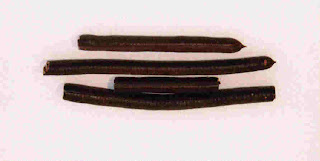US deep storage gold reserves bar list made public
Warren James (the guru of ETF bar list analysis) was tipped off by a reader that the US government had a bar list of its deep storage gold reserves on its website, see Victor's tweets here for details and links. Warren's initial comments are:
"Have already perused the bar numbers - a stack of Rand/Matthey/Rothschild bars there but no match (obviously) for the bar signatures we have in ETF data and happy to say that the sequences are consistent with the data we have. They are (again as you might expect) really old bar sequence numbers. Talking, early Rand number sequences. I gave them both the observation that the spreadsheet seems to have been built up from some older documents - there seem to be some OCR errors, which I assume were from earlier typewritten lists."
He will no doubt come out with a full analysis in due time assessing its internal consistency (as he has done for the ETF bar lists). In the meantime below is a quick analysis of the type of bars. I'm just looking here at the number of bars but have identified clear groupings of bar types. First the raw data:


I think that the sub 2 percent purity cateory is an error. There are 714,993oz of gross weight recorded for this category and if we assume the purity is more likely around 90%, then this spreadsheet understates US gold reserves by 640,000oz!
"Have already perused the bar numbers - a stack of Rand/Matthey/Rothschild bars there but no match (obviously) for the bar signatures we have in ETF data and happy to say that the sequences are consistent with the data we have. They are (again as you might expect) really old bar sequence numbers. Talking, early Rand number sequences. I gave them both the observation that the spreadsheet seems to have been built up from some older documents - there seem to be some OCR errors, which I assume were from earlier typewritten lists."
He will no doubt come out with a full analysis in due time assessing its internal consistency (as he has done for the ETF bar lists). In the meantime below is a quick analysis of the type of bars. I'm just looking here at the number of bars but have identified clear groupings of bar types. First the raw data:

My choice of purity and bar size categories was driven by clear clusterings in the data. The key categories are:

So 8 bar types account for 85% of the bars. No suprise that few meet the LBMA standards for weight and purity, given the source (1930s confiscation, ie coin melt) of most of the gold.
Not suprised to see 100oz bars given that is Comex futures standard, but the 36% is not standard and clearly coin melt source.
Significant is the fact that 55% of all the bars are 90% (+/- .1%) purity and 13% are 22ct (current US Eagle purity). Unusual is the circa 840oz and 1070oz bar sizes, very heavy.
Significant is the fact that 55% of all the bars are 90% (+/- .1%) purity and 13% are 22ct (current US Eagle purity). Unusual is the circa 840oz and 1070oz bar sizes, very heavy.
Note that the LBMA standards are post 1987, hence the bars which are close to LBMA weight and/or under purity are reflective of a general industry standard to 90%+ purity circa 350oz size bars prior to 1987, but this was later firmed up later by the LBMA to the currently 350oz-430oz 99.5%+ standard.
I think that the sub 2 percent purity cateory is an error. There are 714,993oz of gross weight recorded for this category and if we assume the purity is more likely around 90%, then this spreadsheet understates US gold reserves by 640,000oz!
A lot more to come from this data but just wanted to draw attention to this data ASAP and look forward to further analysis and comment by Warren and others.

Comments
Post a Comment